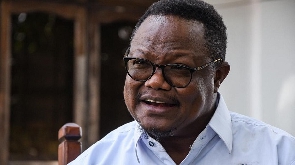New Patriotic Party [NPP] Member of Parliament [MP] for Effiduase-Asokore constituency, Dr. Nana Ayew Afriyie has called on government to supply adequate funds into the National Health Insurance Scheme [NHIS] to fight early breast cancer detection.
Speaking on the floor of parliament to mark the Breast Cancer Awareness Month, the acute medical practitioner said early detection is key in the treatment of breast cancer – but noted that the process is “every expensive”.
He explained that Mammography is the most important screening test for breast cancer and urged that if NHIS is well financed by government – the scheme can afford to take care of breast cancer patients.
"Ever since the introduction of the free maternal healthcare policy, there has not been any new package introduced under the NHIS which target women’s healthcare "I believe the NPP can beat its own record by introducing a complete breast care program that includes mammogram checks."
"While we look at government to provide the funds, it’s about time that additional sources of funding are mobilized from corporate, and the formal sector to augment the current sources of funding for the NHIS fund."
"I am convinced beyond the ordinary that, with some new ways of supporting the scheme explored, breast cancer prevalence will decrease and mortality associated with it will decrease." He told Peacefmonline in an interview
A mammogram is an X-ray of the breast. It can detect breast cancer up to two years before the tumor can be felt by you or your doctor.
Currently there is not sufficient knowledge on the causes of breast cancer; therefore, early detection of the disease remains the cornerstone of breast cancer control.
When breast cancer is detected early, and if adequate diagnosis and treatment are available, there is a good chance that breast cancer can be cured. If detected late, however, curative treatment is often no longer an option.
In such cases, palliative care to relief the suffering of patients and their families is needed.
General News of Friday, 25 October 2019
Source: peacefmonline.com

![Nana Ayew Afriyie, New Patriotic Party [NPP] Member of Parliament Nana Ayew Afriyie, New Patriotic Party [NPP] Member of Parliament](https://cdn.ghanaweb.com/imagelib/pics/424/42413718.295.jpg)











